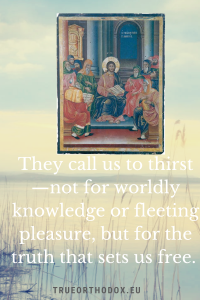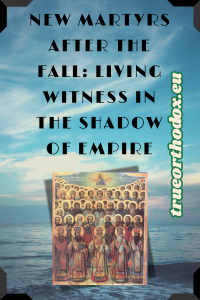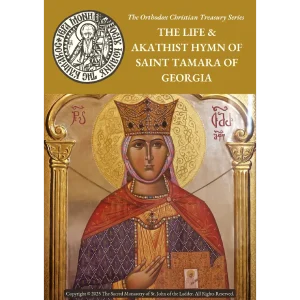Sunday of the Samaritan Woman – Sermon of Archbishop Andrei (Rymarenko)

“Jesus therefore, being wearied with His journey, sat thus on the well: and it was about the sixth hour. There cometh a woman of Samaria to draw water: Jesus saith unto her, Give me to drink” (Jn. 4:6-7). The Samaritan woman became filled with confusion and doubt of a purely worldly nature: How could He, a Jew, ask to drink from her, a Samaritan? The Jews had no dealings with the Samaritans. And even more, He said that if she knew Who He was, then she herself would ask drink from Him, and He would give her Living Water. How could He give her something to drink? Why, He didn’t even have anything to draw water with, and the well was deep.
In worldly terms this was impossible. And what kind of “Living Water” was this? Christ was speaking about heavenly, spiritual things; but she understood in earthly, worldly terms. And she said to Christ: “Sir, Thou hast nothing to draw with, and the well is deep: from whence then hast Thou that living water? …Jesus answered and said unto her: Whosoever drinketh of this water shall thirst again: but whosoever drinketh of the water that I shall give him shall never thirst; but the water that I shall give him shall be in him a well of water springing up into everlasting life”(Jn. 4:11,13-14).
Still more confusing. But one thing was clear. He was offering a completely unusual kind of water. He who drank of it would never thirst. What a convenience. She would never have to come to this well and bend down to draw water. What a work and time saver. Although this offer seemed incredible, it was just too tempting and profitable to pass up; it paid to try it at least. “Sir, give me this water, that I thirst not, neither come hither to draw” (Jn. 4:15), said the Samaritan woman in absolute frankness, explaining the practical point of view she had in mind. And now she stood, in full anticipation of a material, worldly gift. And Christ, now using her attention, suddenly changed the topic of conversation: “Go, call thy husband and come hither. The woman answered and said, I have no husband. Jesus said unto her, Thou hast well said, I have no husband, for thou hast had five husbands: and he whom thou now hast is not thy husband: in that saidst thou truly” (Jn. 4:16-18).
Terror and joy seized the Samaritan woman. This was the secret of her life, which tormented her sick conscience. How much she wanted to free herself from these pangs of Conscience, to repent. But until this time no one could help her. But now, before her stood the One Who knew the secret of her heart. This was an unusual man. He could save her, teach her to repent, to pray. But where to pray? The woman said to Him: “Sir, I perceive that thou art a prophet. Our fathers worshipped in this mountain; and ye say, that in Jerusalem is the place where men ought to worship. Jesus saith unto her, Woman, believe me…the hour cometh, and now is, when the true worshippers shall worship the Father in spirit and in truth: for the Father seeketh such to worship Him. God is a Spirit: and they that worship Him must worship in spirit and in truth” (Jn. 4:19-21, 23-24). The heart of the Samaritan woman accepted this Divine revelation with trembling, but still she was living by what she knew in worldly terms: “I know [she said] that Messias cometh, which is called Christ: when he is come, he will tell us all things. Jesus saith unto her, I that speak unto thee am He”(Jn. 4:25-26). This was all. All earthly understandings were overturned. She became a new person. She believed.
Is it not the same with us, brothers and sisters? So often we ask God for earthly goods which to us seem so necessary, and God does not give them to us. Yet our prayer is never in vain. So it was with the Samaritan woman. She asked Christ for water. And He gave her water, but not the one she was asking for, but another one — His water, which became a “well of water springing up into everlasting life.” He gave her Eternal Life. But in order to receive this water of Christ, she had to repent.
Let us do the same. Then He will reveal Himself to us and say, “I that speak unto thee am He/’ And we will have such joy that we will not be able to contain it within ourselves. No. Without noticing it ourselves, we will start to preach Christ. And not in words only, but in our whole life. And those around us will say: “Now we believe, not because of thy saying,” but seeing thy life which thou hast dedicated to Him, we “know that this is indeed the Christ, the Savior of the world!” (Jn. 4:42).







